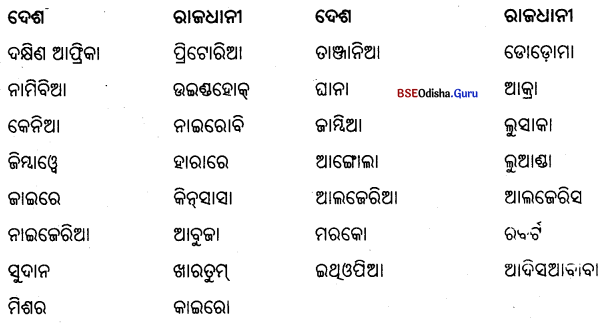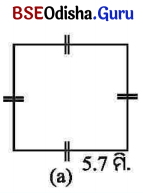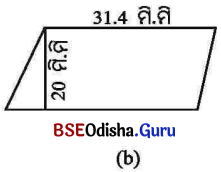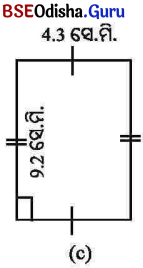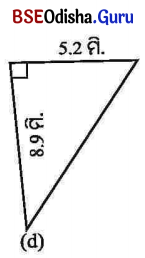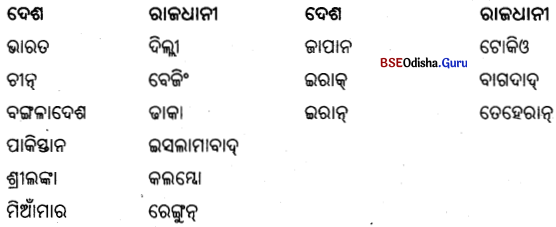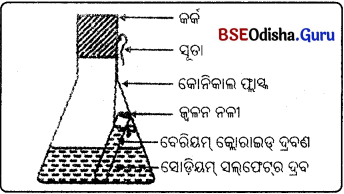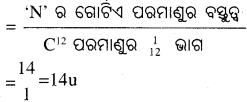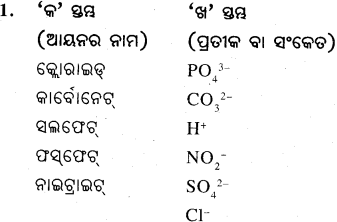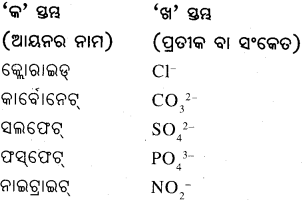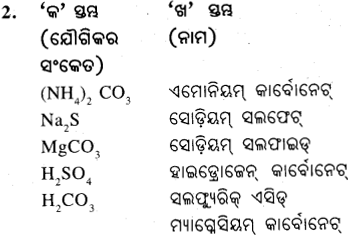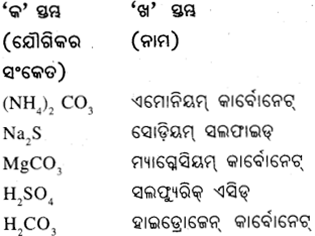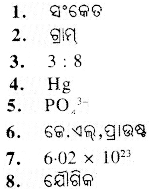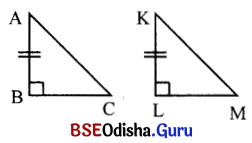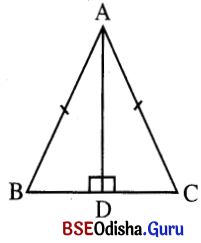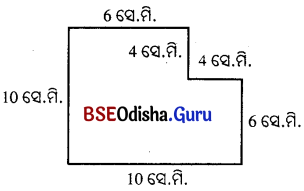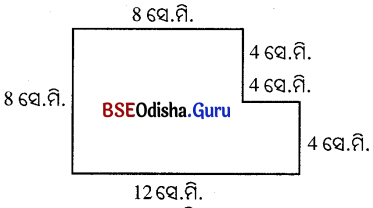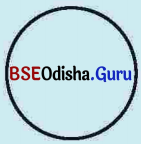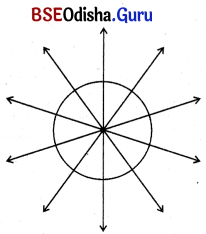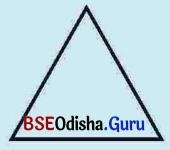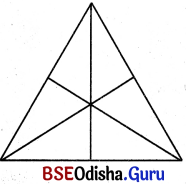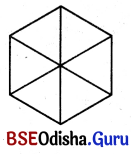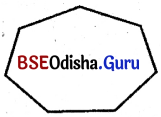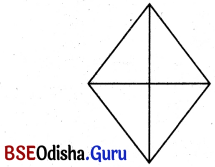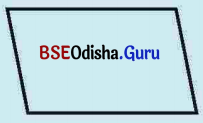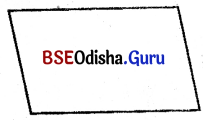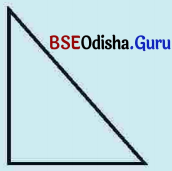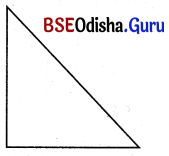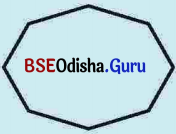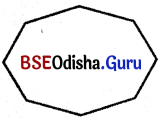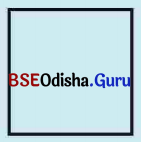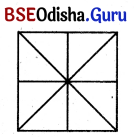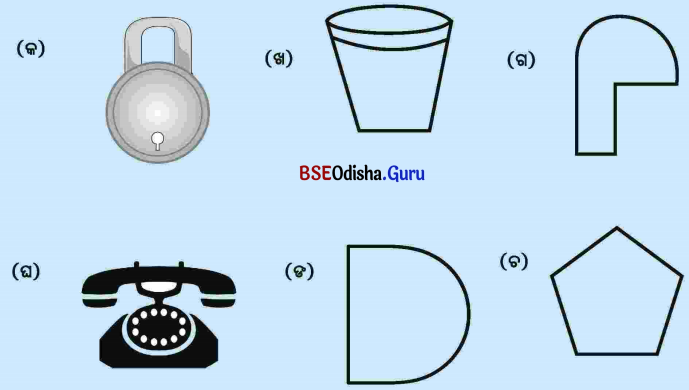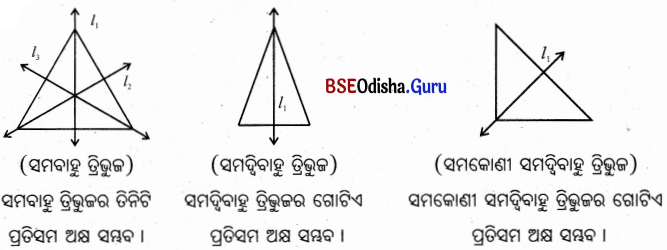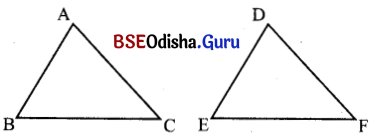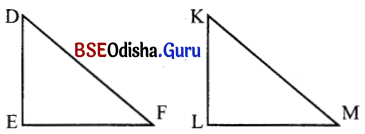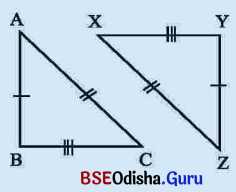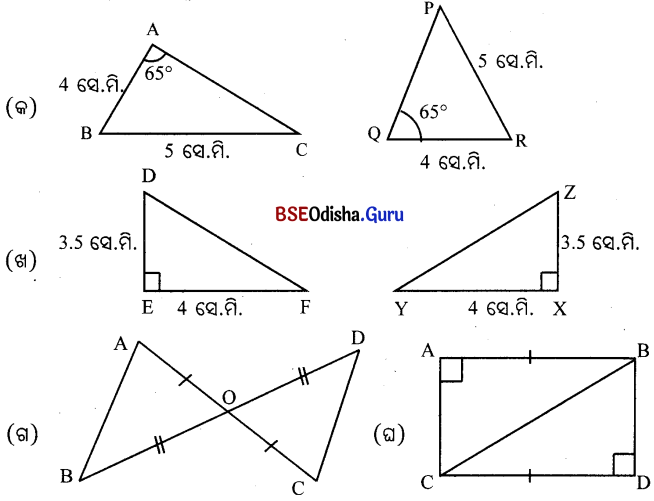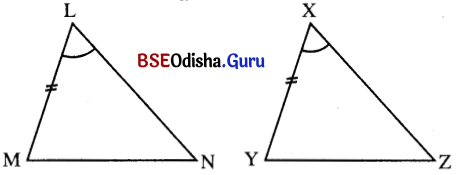Odisha State Board BSE Odisha 9th Class Physical Science Important Questions Chapter 2 ଆମ ଚାରିପାଖରେ ଥବା ପଦାର୍ଥ ବିଶୁଦ୍ଧ କି ? Important Questions and Answers.
BSE Odisha 9th Class Physical Science Important Questions Chapter 2 ଆମ ଚାରିପାଖରେ ଥବା ପଦାର୍ଥ ବିଶୁଦ୍ଧ କି ?
Subjective Type Questions With Answers

1. ଦ୍ରବଣ କାହାକୁ କୁହାଯାଏ ? ଦ୍ରବଣର ଧର୍ମଗୁଡ଼ିକୁ ଉଲ୍ଲେଖ କର ।
ଉ-
ଦ୍ରବଣ : ଦୁଇ ବା ତତୋଽଧ୍ଵକ ବସ୍ତୁର ସମଜାତୀୟ ମିଶ୍ରଣକୁ ଦ୍ରବଣ କୁହାଯାଏ ।
ଦ୍ରବଣର ଧର୍ମ :
(i) ଏକ ଦ୍ରବଣ ହେଉଛି ସମଜାତୀୟ ମିଶ୍ରଣ ।
(ii) ଏହାର କଣି କାରୁଡ଼ିକର ବ୍ୟାସ ଏକ ନାନୋମିଟର (1 nm ବା 10-9m) ଠାରୁ ଛୋଟ । ତେଣୁ ଏଗୁଡ଼ିକ ଖାଲି ଆଖିରେ
(iii) ଅତି କ୍ଷୁଦ୍ର ଆକାର ଯୋଗୁଁ ଦ୍ରବଣର ଆଲୋକ ରଶ୍ମି କୁ ବିଚ୍ଛୁରିତ (scatter) କରିପାରନ୍ତି ନାହିଁ । ତେଣୁ ଆଲୋକ ରଶ୍ମିର
(iv) ପରି ସ୍ରବଣ ପଦ୍ଧତି ଦ୍ଵାରା ଦ୍ରବଣରୁ ଦ୍ରବର ନାହିଁ । ଦ୍ରବଣକୁ ସ୍ଥିର ଭାବେ ରଖୁ ଦେଲେ ବସିଯାଆନ୍ତି ନାହିଁ । ତେଣୁ ଦ୍ରବଣ ସ୍ଥିର (stable) ଅ6ଟ ।
2. ସସ୍ପେନସନ୍ କାହାକୁ କୁହାଯାଏ ? ଏହାର ଧର୍ମଗୁଡ଼ିକୁ ଲେଖ ।
ଉ-
ସସ୍ ପେନ୍ ସନ୍ : ସସ୍ ପେନ୍ ସନ ଏକ ଅବସ୍ଥାରେ ରହିଥାଏ । ସସ୍ପେନ୍ସନର ଧର୍ମ :
(i) ସସ୍ପେନ୍ସନ ଏକ ଅସମଜାତୀୟ ମିଶ୍ରଣ ।
(ii) ସସ୍ପେନ୍ସନର କଣିକାଗୁଡ଼ିକ ଖାଲି ଆଖୁକୁ
(iii) ସସ୍ପେନ୍ସନର କଣିକାଗୁଡ଼ିକ ସସ୍ପେନ୍ସନ ମଧ୍ୟରେ ଗତି କରୁଥିବା ରଶ୍ମି ଗୁଚ୍ଛକୁ ବିଚ୍ଛୁରିତ ହୋଇଥାଏ ।
(iv) ସସ୍ପେନ୍ସନ ରହିଥିବା ପାତ୍ରକୁ ସ୍ଥିର ରଖୁଲେ (unstable) ଅଟ ।
3. କଲଏଡ୍ର ଧର୍ମଗୁଡ଼ିକୁ ବର୍ଣନା କର ।
ଉ-
କଲଏଡ୍ର ଧର୍ମ :
(i) କଲଏଡ୍ ଗୋଟିଏ ଅସମ ଜାତୀୟ ମିଶ୍ରଣ ।
(ii) କଲଏଡ୍ କଣିକାଗୁଡ଼ିକ ବହୁତ ଛୋଟ ଓ ଦେଖୁବା ଅନେକ କ୍ଷେତ୍ରରେ ସମ୍ଭବ ହୁଏ ନାହିଁ ।
(iii) କଲଏଡ୍ର କଣିକାଗୁଡ଼ିକ କିନ୍ତୁ ଆଲୋକ ରଶ୍ମି କଲଏଡ୍ ଭିତରେ ଦେଖାଯାଏ ।
(iv) ଏହାକୁ ହଲଚଲ ନକରି ରଖୁଲେ ମଧ୍ୟ ଏହି କଲଏଡ୍ ସମ୍ପୂର୍ଣ୍ଣ ସ୍ଥିର ଅଟେ ।
(v) ପରିସ୍ରବଣ ପଦ୍ଧତିଦ୍ଵାରା କଲଏଡ଼୍ କଣିକାଗୁଡ଼ିକୁ ମାତ୍ର ଏକ ସ୍ଵତନ୍ତ୍ର (Centrifugation) ପଦ୍ଧତିଦ୍ଵାରା କେନ୍ଦ୍ରାପସା ର ଣ କଲଏଡାଲ୍ କ ଣି କ ଗୁ ଡ଼ି କୁ କରାଯାଇପାରିବ ।

4. ଦୁଇଟି ମିଶୁ ନଥୁବା ତରଳ ପଦାର୍ଥର ମିଶ୍ରଣକୁ କିପରି ଅଲଗା କରାଯାଇପାରିବ ଚିତ୍ର ସହ ପରୀକ୍ଷାଟି ବର୍ଣ୍ଣନା କର । ଏହାର ଦୁଇଟି ପ୍ରୟୋଗ ଲେଖ ।
ଉ –
ପରୀକ୍ଷା :

(i) କିରୋସିନ ତେଲ ଓ ଜଳର ମିଶ୍ରଣକୁ ଏକ ପୃଥକ୍କାରୀ ଫନେଲର ତ କ। ଯ।ଡ୍।
(ii) ଏହାକୁ କିଛି ସମୟ ହଲଚଲ୍ ନ କରି ରଖାଯାଉ । ଏହାଯୋଗୁଁ କିରୋସିନି ତେଲ ଓ ଜଳର ପୃଥକ୍ ସ୍ତର ସୃଷ୍ଟି ହେବ ।
(iii) ପୃଥକ୍କାରୀ ଫନେଲ୍ର ଷ୍ଟପ୍କକ୍କୁ ଖୋଲାଯାଉ ଓ ତଳ ସ୍ତରରେ ଥିବା ଜଳକୁ ଯତ୍ନ ସହକାରେ ତଳ ମୁହଁ ବାଟେ କାଢ଼ି ନିଆଯାଉ ।
(iv) ପୃଥକ୍କାରୀ ଫନେଲର ଉପର ସ୍ତରରେ ଥିବା ତେଲ ଯେତେବେଳେ ଷ୍ଟପ୍କକ୍ ନିକଟକୁ ଖସି ଆସିବ ସେତେବେଳେ ଷ୍ଟପ୍କକ୍କୁ ମୋଡ଼ି ପ୍ଟ ନର୍ବ ।ର ନ୍ଦ କର। ଯ।ଡ।
ପ୍ରୟୋଗ :
(i) ଏହା ତେଲ ଓ ଜଳର ମିଶ୍ରଣକୁ ଅଲଗା କରେ ।
(ii) ଲୁ ହାକୁ ତା’ର ଧାତୁ ପିଣ୍ଡରୁ ଅଲଗା କଲାବେଳେ ଏହି ପଦ୍ଧତି ଦ୍ଵାରା ହାଲୁ କା ଧାତୁ ମଳକୁ ଉପର ସ୍ତରରୁ ଅଲଗା କରି ଦିଆଯାଏ, ଯାହା ଫଳରେ ତରଳ ଲୁହା ଫର୍ମେସ୍ର ତଳେ ରହିଯାଏ ।
5. ସୋଲତ୍ରବଶ ଓଉ।ଯମାନ କଣିକ। ପରଯର ଯରଠାରୁ କିପରି ପୃଥକ୍, ବୁଝାଇ ଦିଅ ।
ଉ-
(i) ସୋଲ, ଦ୍ରବଣ ଓ ଭାସମାନ କଣି କ ପରସ୍ପରଠାରୁ ପୃଥକ୍ ଅଟେ ।
(ii) ସୋଲ ହେଉଛି ଏକ ଅସମଜାତୀୟ କଲଏଡ଼ାଲ କଣିକାମାନଙ୍କ ମିଶ୍ରଣ । ଏହାର ବିକ୍ଷେପଣ ମାଧ୍ୟମ ହେଉଛି ତରଳ । ଆଲୋକ ରଶ୍ମି ଏହା ମଧ୍ୟରେ ଗତି କଲାବେଳେ ବିଚ୍ଛୁରିତ କେନ୍ଦ୍ର ପସାରୀ ପଦ୍ଧତି ଦ୍ଵାରା ଏହାର
(iii) ଦ୍ରବଣ ହେଉଛି ଏକ ସମଜାତୀୟ ମିଶ୍ରଣ । ଏହାର କ ଣି କା। ରୁ ଡ଼ି କର ବ୍ୟାସ 10-9 ମିଟରଠାରୁ ସାନ । ତେଣୁ ଏହି କଣିକା ଖାଲି ଆଖୁରେ ଦେଖାଯାଆନ୍ତି ନାହିଁ । ଦ୍ରବଣର ଜଣିଜ।ମ।କେ ଆଲେ।କ ରଶ୍ମକୁ ରଚ୍ଛୁରିତ କରିପାରନ୍ତି ନା ହିଁ।ପଟି ସରଣ ପଦ୍ଧତିରେ ଦ୍ରବଣରୁ ଦ୍ରବର କଣିକାଗୁଡ଼ିକୁ ଅଲଗା କରାଯାଇ ପାରିବ ନାହିଁ ।
(iv) ଅସମଜାତୀୟ ମିଶ୍ର ଣ ମଧ୍ୟରେ ଥିବା । କୁହାଯାଏ । ଏଗୁଡ଼ିକ ମିଶ୍ରଣରେ ଦ୍ରବୀଭୂତ ନହୋଇ ଭାସମାନ ଅବସ୍ଥାରେ ରହିଥା’ନ୍ତି । ଏହି କଣିକା ଗୁଡ଼ିକ ଖାଲି ଖୁରେ ଦେଖାଯାଆନ୍ତି । ଏହା ମଧ୍ୟରେ ଆଲୋକରଶ୍ମି ବିଚ୍ଛୁରିତ ହୋଇଥାଏ । ଅର୍ଥାତ୍ ଏହା ମଧ୍ୟରେ ଆଲୋକର ଗତିପଥ ଦୃଶ୍ୟମାନ ହୋଇଥାଏ ।
(v) ଏହି ଭାସମାନ ଅବସ୍ଥାରେ ଥିବା ଦ୍ରବର କଣିକାଗୁଡ଼ିକୁ ପରିସ୍ରବଣ ପର୍ବଟିରେ ପୃଥକ୍ କରାଯାଇ ପାରିବ ।

1. ମିଶ୍ରଣ ଓ ଯୌଗିକ ମଧ୍ୟରେ ପାର୍ଥକ୍ୟ ଦର୍ଶାଅ
ଉ-
ମିଶ୍ରଣ:
(i) ମୌଳିକ ବା ଯୌଗିକଗୁଡ଼ିକ ଏକାଠି ମିଶି ଏକ ମିଶ୍ରଣ ସୃଷ୍ଟି କରନ୍ତି ମାତ୍ର କୌଣସି ନୂତନ ଯୌଗିକ ଗଠିତ ହୁଏ ନାହିଁ ।
(ii) ଏକ ମିଶ୍ରଣର ସଂଯୁକ୍ତ ପରିବର୍ତ୍ତନଶୀଳ।
(iii) ଗୋଟିଏ ମିଶ୍ରଣ ଯେଉଁ ଉପାଦାନକୁ ନେଇ ଗଠିତ ସେମାନଙ୍କର ଧର୍ମ ପ୍ରଦର୍ଶନ କରେ ।
(iv) ମିଶ୍ରଣର ଉପାଦାନଗୁଡ଼ିକୁ ଅତି ସହଜରେ ଓ ସରଳଭାବେ ଭୌତିକ ପଦ୍ଧତି ଦ୍ଵାରା ପୃଥକ୍ କରାଯାଇପାରିବ ।
ଯୌଗିକ:
(i) ମୌଳିକମାନେ ମିଶିଲାବେଳେ ପରସ୍ପର ସହ ପ୍ରତିକ୍ରିୟା କରି ନୂତନ ଯୌଗିକ ସୃଷ୍ଟି କରିଥା’ନ୍ତି ।
(ii) ସୃଷ୍ଟି ହୋଇଥିବା ପ୍ରତ୍ୟେକ ନୂତନ ପଦାର୍ଥର ସଂଯୁକ୍ତି ସର୍ବଦା ନିର୍ଦ୍ଦିଷ୍ଟ (fixed) ଅଟେ ।
(iii) ସୃଷ୍ଟି ହୋଇଥିବା ନୂତନ ପଦାର୍ଥଟି ସଂପୂର୍ଣ୍ଣ ଭିନ୍ନ ଧର୍ମ ପ୍ରଦର୍ଶନ କରିଥାଏ ।
(iv) କେବଳ ରାସାୟନିକ ବା ବିଦ୍ୟୁତ୍ ରାସାୟନିକ ପୃଥକ୍ କରାଯାଇପାରିବ ।

2. ଧାତୁ ଓ ଅଧାତୁ ମଧ୍ୟରେ ପାର୍ଥକ୍ୟ ଦର୍ଶାଅ ।
ଉ-
ଧାତୁ:
(i) ଧାତୁଗୁଡ଼ିକର ଔଜ୍ୱଲ୍ୟ ଥାଏ ।
(ii) ଏଗୁଡ଼ିକ ନମନୀୟ ଓ ତନ୍ୟ ।
(iii) ଏଗୁଡ଼ିକ ତାପ ଓ ବିଦ୍ୟୁତ୍ ସୁପରିବାହୀ ।
(iv) ଏଗୁଡ଼ିକର ଗଳନାଙ୍କ ଓ ସ୍ଫୁଟନାଙ୍କ ଉଚ୍ଚା ।
ଅଧାତୁ:
(i) ଅଧାତୁଗୁଡ଼ିକର ଔଜ୍ୱଲ୍ୟ ନଥାଏ ।
(ii) ଅଧାତୁଗୁଡ଼ିକ ନମନୀୟ ଓ ତନ୍ୟ ନୁହଁନ୍ତି ।
(iii) ଏଗୁଡ଼ିକ ତାପ ଓ ବିଦ୍ୟୁତ୍ କୁପରିବାହୀ ।
(iv) ଏଗୁଡ଼ିକର ଗଳନାଙ୍କ ଓ ସ୍ଫୁଟନାଙ୍କ କମ୍ ।
3. ଭୌତିକ ପରିବର୍ତ୍ତନ ଓ ରାସାୟନିକ ପରିବର୍ତ୍ତନ ମଧ୍ଯରେ ପାର୍ଥକ୍ୟ ଦର୍ଶାଅ
ଉ-
ଭୌତିକ ପରିବର୍ତ୍ତନ:
(i) ଭୌତିକ ପରିବର୍ତ୍ତନରେ ପଦାର୍ଥର କେବଳ ରୂପ, ବର୍ଣ୍ଣ ଆଦିର ସାମୟିକ ପରିବର୍ତ୍ତନ ଘଟିଥାଏ ।
(ii) ଏହି ପରିବର୍ତନ ଅସ୍ଥାୟୀ ଓ ପ୍ରତ୍ୟାବର୍ତ୍ତୀ ।
(iii) ଏଥିରେ ବସ୍ତୁତ୍ଵର ପରିବର୍ତ୍ତନ ଘଟେ ନାହିଁ ।
(iv) ଏଥରେ ନୂତନ ପଦାର୍ଥ ସୃଷ୍ଟି ହୁଏ ନାହିଁ ।
ରାସାୟନିକ ପରିବର୍ତ୍ତନ:
(i) ରାସାୟନିକ ପରିବର୍ତ୍ତନରେ ଅଣୁ ସଂରଚନାର ସ୍ଥାୟୀ ପରିବର୍ତ୍ତନ ଘଟିଥାଏ ।
(ii) ଏହି ପରିବର୍ତ୍ତନ ସ୍ଥାୟୀ ଓ ଅପ୍ରତ୍ୟାବର୍ତ୍ତୀ ।
(iii) ଏଥରେ ବସ୍ତୁତ୍ଵର ପରିବର୍ତ୍ତନ ଘଟିଥାଏ ।
(iv) ଏଥୁରେ ନୂତନ ପଦାର୍ଥ ସୃଷ୍ଟି ହୁଏ ।
4. ଦୁଇଟି ମିଶିଯାଇଥିବା ତଜଳକୁ କିପରି ପୃଥକ୍ କରାଯାଏ ?
ଉ-
(i) ଦୁ ଇଟି ମି ଶି ଯାଇଥ୍ ବା ତରଳ ମାନଙ୍କର ଥାଏ ଓ ଉତ୍ତପ୍ତ ହୋଇ ଫୁଟିଲାବେଳେ ତାହା ପ୍ରଥମେ ବାଷ୍ପୀଭୂତ କରି ତରଳରେ ପରିଣତ କରାଯାଇପାରିବ । ଏହି ପଦାର୍ଥ ସଂପୂର୍ଣ୍ଣ ବାଷ୍ପରେ ପରିଣତ ହେବା ପର୍ଯ୍ୟନ୍ତ ବିଶିଷ୍ଟ ତରଳଟି ବାଷ୍ପୀଭୂତ ହେବ ନାହିଁ ।
(ii) ଯଦି ଦୁଇଟି ମିଶିଯାଇଥିବା ତରଳର ସ୍ଫୁଟନାଙ୍କ ମଧ୍ୟରେ ପାର୍ଥକ୍ୟ 25 K ରୁ କମ୍ ସେହି ମିଶ୍ରଣକୁ ଆଂଶିକ ପାତନ ପ୍ରଣାଳୀ ଅଟେ ବ୍ୟବହାର କରି ପୃଥକ୍ କରାଯାଇ ପାରିବ ।
5. ଦ୍ରବଣର ଗାଢ଼ତା କ’ଣ ଓ ଏହା କିପରି ନିର୍ଣ୍ଣୟ କରାଯାଏ ?
ଉ-
ଦ୍ରବଣ ମଧ୍ଯରେ ଦ୍ରବୀଭୂତ ଦ୍ରବର ପରିମାଣ ଓ ଦ୍ରବଣର ପରିମାଣର ଅନୁସାହାରା ଦୁବାର ଗାଢ଼ତା ପ୍ରକାଶ କରାଯାଏ ।
(i) ଏକ ଦ୍ରବଣର ବସ୍ତୁତ୍ଵ ବିଭକ୍ତ ବସ୍ତୁତ୍ୱ ଶତକଡ଼ା

(ii) ଏକ ଦ୍ରବଣର ବସ୍ତୁତ୍ଵ ବିଭକ୍ତ ଆୟତନ ଶତକଡ଼ା ଅନୁ ପାତ

6. କଲ ଏଡ୍ ମଧ୍ୟରେ ଆଲୋକର ଗତି ପଥ
ଉ-
(i) କଲଏଡ଼ର କଣିକାଗୁଡ଼ିକ କ୍ଷୁଦ୍ର ହୋଇଥିବାରୁ ଆମକୁ ଖାଲି ଆଖୁରେ ଦେଖାଯାଏ ନାହିଁ ।
(ii) ମାତ୍ର ଆଲୋକର କଣିକା ପାଇଁ ଏହି କଲଏଡ଼ କଣିକାର ଆକାର ଯଥେଷ୍ଟ ଅଧିକ ହୋଇଥିବାରୁ ଏଥିରେ ଆଲୋକ ପଡ଼ିଲେ ବିଚ୍ଛୁରିତ ହୋଇଥାଏ ।
(iii) ଏହି ବିସ୍ମରଣ ଯୋଗୁଁ ଆଲୋକର ଗତିପଥ କଲଏଡ଼ ଦ୍ରବଣ ମଧ୍ୟରେ ଦେଖାଯାଏ ।

7. ଏମୋନିୟମ୍ କ୍ଲୋରାଇଡ ଓ ଲୁଣର ପୃଥକୀକରଣ କିପରି କରାଯାଏ ଲେଖ ।
ଭ-
(i) ଏମୋନିୟମ୍ କ୍ଲୋରାଇଡ଼ ଏକ ଊର୍ଦ୍ଧ୍ୱ ପାତୀ
(ii) ଏମୋନିୟମ କ୍ଲୋରାଇଡ୍ ଓ ଲୁଣର ମିଶ୍ରଣକୁ ଏକ ଚିନାମାଟି ପାତ୍ରରେ ରଖି ତା ଉପରେ ଏକ ନେଲ୍କୁ ଘୋଡ଼ାଇ ରଖାଯାଏ ଓ ନେଲ୍ ନଳୀର ଶେଷ ମୁଣ୍ଡରେ ତୁଳାଠିପି ଦିଆଯାଏ ।
(iii) ଏହି ଚିନାମାଟି ପାତ୍ରକୁ ଉତ୍ତପ୍ତ କଲେ ଏମେ। ନିୟମ ବ୍ଲା ରାଇଡ୍ ସାଧାସଳଖ ବାଷ୍ପରେ ପରିଣତ ହେବ ଏବଂ ନେଲ୍ ବାଷ୍ପରେ ପରିଣତ ହେବ ଏବଂ ନେଲ୍ ଲାଖ୍ ରହିବ ।
(iv) ଏହି ପରି ଆମେ ଲୁଣରୁ ଏମୋନି ୟମ କ୍ଲୋରାଇଡ୍କୁ ପୃଥକ୍ କରିପାରିବା ।

1. ଗୋଟିଏ ଦ୍ରବଣରେ 350 ଗ୍ରାମ୍ ଜଳରେ 50 ଗ୍ରାମ୍ର ସାଧାରଣ ଲୁଣ ରହିଛି । ବସ୍ତୁତ୍ଵ ହରଣ ବେଳେ ବ୍ରିଟିଶର ବିରୁଦ୍ର ହଜଣ ବିଗୁରୁ ଶତକଡ଼ା କର ।
ଉ –
ଦ୍ରବ (ଲୁଣ)ର ବସ୍ତୁତ୍ଵ = 50 ଗ୍ରାମ୍
ଦ୍ରାବକର ବସ୍ତୁତ୍ଵ = 350 ଗ୍ରାମ୍
ଦ୍ରବଣର ବସ୍ତୁତ୍ଵ = ଦ୍ରବର ବସ୍ତୁତ୍ୱ + ଦ୍ରାବକର ବସ୍ତୁତ୍ଵ
= (50+350) ଗ୍ରାମ୍ = 400 ଗ୍ରାମ୍
ଦ୍ରବଣର ବସ୍ତୁତ୍ଵ ଣତକାଡ଼। ଅନୁପ।ତ

2. 293 K ତାପମାତ୍ରାରେ 100 ଗ୍ରାମ୍ ଜଳରେ 36 ଗ୍ରାମର କୋଡ଼ିୟମ୍ କ୍ଲୋରାଇଡ ମିଶାଇ ଏକ ପୁଲ ଦ୍ରବଣ ପ୍ରସ୍ତୁତ କରାଗଲା । ଜିଲ୍ଲା ତାପମାତ୍ରାରେ ଦ୍ରବଣର ଗାଢ଼ତା ନିର୍ଣ୍ଣୟ କର ।
ଭ-
ଦ୍ରବର ବସ୍ତୁତ୍ଵ = 36 ଗ୍ରାମ୍
ଦ୍ରାବକର ବସ୍ତୁତ୍ଵ = 100 ଗ୍ରାମ୍
ଦ୍ରବଣର ବସ୍ତୁତ୍ଵ = ଦ୍ରବର ବସ୍ତୁତ୍ଵ + ଦ୍ରାବକର
ବସ୍ତୁତ୍ଵ = 36 ଗ୍ରାମ୍ + 100 ଗ୍ରାମ୍ = 136 ଗ୍ରାମ୍

ତ୍ରବଣର ଗ। ଢ଼ ତ। = 26.47

3. ମୌଳିକଗୁଡ଼ିକର ପ୍ରକୃତି ସମ୍ବନ୍ଧରେ ଲେଖ ।
ଭ-
(i) ପ୍ରତ୍ୟେକ ମୌଳିକର ନିର୍ଦ୍ଦିଷ୍ଟ ରଙ୍ଗ, ଗନ୍ଧ, ସାନ୍ଦ୍ରତା, ଦ୍ର ବ ଣୀୟତା, ତନ୍ୟତା, ପାରମାଣବିକ ବସ୍ତୁତ୍ଵ ଆଦି ଭୌତିକ ଧର୍ମ ଅଛି ।
(ii) ଏକ ବା ଏକାଧ୍ଵକ ମୌଳିକ ଅନ୍ୟ ମୌଳିକ ଏକ ରୁ ଅଧୁକ ଯୌଗିକ ସୃଷ୍ଟି କରନ୍ତି । ମୌଳିକର ଏହି ପ୍ରକୃତିକୁ ରାସାୟନିକ ଧର୍ମ କୁହାଯାଏ ।
4. ସାଧାରଣ ବାବନ କୌଶଳଠାରୁ ସ୍ଫଟିକୀକରଣ କୌଶଳ ଅଧିକ ଭଲ କାହିଁକି ?
ଭ-
(i) ଶୁଷ୍କ ହେବା ପର୍ଯ୍ୟନ୍ତ ଗରମ କଲେ କେତେକ କଠିନ ବିଘଟିତ ହୋଇଯା’ନ୍ତି ଅଥବା ଆଉ କେତେକ କଠିନ ଚିନି ପରି ସମ୍ପୂର୍ଣ୍ଣ ଭାବରେ ପୋଡ଼ିଯାଇ କଳା ହୋଇଯା’ନ୍ତି ।
(ii) ପରିସ୍ରବଣ ପରେ ବି କେତେକ ଅପଦ୍ରବ କୌଶଳ ବାଷ୍ପୀଭବନଠାରୁ ଅଧିକ ଭଲ ।
5. ଏକ ନିର୍ଦ୍ଦିଷ୍ଟ ତାପମାତ୍ରାରେ ଗୋଟିଏ ପୃକ୍ତ ଦ୍ରବଣ ନେଇ ତାହାକୁ ଧୀରେ ଧୀରେ ଥଣ୍ଡା କଲେ କ’ଣ ହେବ ?
ଉ-
ଏକ ନିର୍ଦ୍ଦିଷ୍ଟ ତାପମାତ୍ରାରେ ଗୋଟିଏ ପୃକ୍ତ ଦ୍ରବଣ ନେଇ ତାହାକୁ ଧୀରେ ଧୀରେ ଥଣ୍ଡା କଲେ ତାହାର ଗାଢ଼ତା ବୃଦ୍ଧି ପାଇବ, ଅର୍ଥାତ୍ ଆମେ ଏକ ଗାଢ଼ ଦ୍ରବଣ ପାଇବାନ୍ତ କାରଣ ଏଥୁରେ ଦ୍ରବର ପରିମାଣ ଅଧିକ ରହିଛି ।

6. ସ୍ଫଟିକୀକରଣର କୌଶଳଦ୍ଵାରା କେଉଁ ପ୍ରକାର ମିଶ୍ରଣମାନଙ୍କୁ ପୃଥକ୍ କରାଯାଇଥାଏ ?
ଭ-
(i) ସମୁଦ୍ର ଜଳ ଏକ ସମଜାତୀୟ ମିଶ୍ରଣ । ଏହି ଜଳରୁ ମିଳୁଥୁବା ଲୁଣରେ ଅନେକ ଅପଦ୍ରବ ରହିଥାଏ । ସ୍ଫଟିକୀକରଣ ପ୍ରଣାଳୀ ବ୍ୟବହାର କରାଯାଏ ।
(ii) ସ୍ଫଟିକୀକରଣ ପଦ୍ଧତିରେ ଦ୍ରବଣରୁ ଶୁଦ୍ଧ କଠିନକୁ ସ୍ଫଟିକ ଆକାରରେ ଅଲଗା କରାଯାଇଥାଏ ।
7. ପୃଥକୀକରଣ ପାଇଁ ବ୍ୟବହୃତ ପୃଥକକାୟୀ ଫନେଲ୍ର ପ୍ରୟୋଗ ଲେଖ ।
ଉ-
(i) ପୃଥକ୍କାରୀ ନେଲ୍ ତେଲ ଓ ଜଳର ମିଶ୍ରଣକୁ ଅଲଗା କରେ ।
(ii) ଲୁହାକୁ ତାହାର ଧାତୁପିଣ୍ଡରୁ ଅଲଗା କଲାବେଳେଏହି ପଦ୍ଧତିଦ୍ଵାରା ହାଲୁକା ଧାତୁମ ଳକୁ ଉପର ନ୍ତରରୁ ଅଲଗା କରିଦିଆଯାଏ । ଫ ଳରେ ତରଳ ‘ଲୁହା ଫର୍ମେସ୍ର ତଳେ ରହିଯାଏ ।
Objective Type Questions with Answers
A. ଗୋଟିଏ ବାକ୍ୟରେ ଉତ୍ତର ଦିଅ ।
1. ସମଜାତୀୟ ମିଶ୍ରଣ କାହାକୁ କୁହାଯାଏ ?
ଉ-
ଯେଉଁ ମିଶ୍ରଣରେ ଉପାଦାନଗୁଡ଼ିକର ସଂଯୋଜନ ସବୁ ଅଂଶ)ର ସମାଜ, ତାହାକୁ ଏକ ସମକାଳୀୟ ମିଶ୍ରଣ କୁହାଯାଏ ।
2. ଦୁଇଟି ଅସମଜାତୀୟ ମିଶ୍ରଣର ଉଦାହରଣ ଦିଅ ।
ଉ-
ସୋଡ଼ିୟମ୍ କ୍ଲୋରାଇଡ୍ ଓ ଲୁହାଗୁଣ୍ଡର ମିଶ୍ରଣ, ତେଲ ଓ ଜଳର ମିଶ୍ରଣ ।
3. ଦ୍ରବଣ କାହାକୁ କୁହାଯାଏ ?
ଉ-
ଦ୍ରବ ବା ତତୋଧିକ ବସୁର ତ୍ସମକ।ତାଯୀ ମିଣ୍ଶକୁ ଦ୍ରବଣ କୁହାଯାଏ ।

4. ଏଲୟକୁ କାହିଁକି ଏକ ମିଶ୍ରଣ ରୂପେ ଗ୍ରହଣ କରାଯାଏ ?
ଉ-
ଏଲୟ ତାହାର ଉପାଦାନଗୁଡ଼ିକର ଧର୍ମ ପ୍ରଦର୍ଶନ ରହିପାରେ । ତେଣୁ ଏଲୟ ଏକ ମିଶ୍ରଣ ।
5. ଦ୍ରାବକ କାହାକୁ କୁହାଯାଏ ?
ଉ-
ଦ୍ରବଣ ମଧ୍ଯରେ ଯେଉଁ ଉପାଦାନଟି ସାଧାରଣତଃ ଅଧ୍ୟକ ପରିମାଣରେ ଥାଏ ଓ ଯାହା ମଧ୍ୟରେ ଅନ୍ୟ ଉପାଦାନଟି ଦ୍ରବୀଭୂତ ହୋଇଥାଏ, ତାହାକୁ ଦ୍ରାବକ କୁହାଯାଏ ।
6. ଦ୍ରବ କାହାକୁ କୁହାଯାଏ ?
ଉ-
ଯେ ଗାଁ ଉପାତାଳଚି ତ୍ରବଣ ମଧ୍ୟରେ ଳମ୍ ପରିମାଣରେ ଥାଏ ଓ ସ୍ନାତକ ମଧ୍ଯରେ ଦ୍ରବୀଭୂତ ହୋଇଥାଏ, ତାହାକୁ ଦ୍ରବ କୁହାଯାଏ ।
7. ପୃକ୍ତ ଦ୍ରବଣ କାହାକୁ କୁହାଯାଏ ?
ଭ-
ଗୋଟିଏ ନିର୍ଦ୍ଦିଷ୍ଟ ତାପମାତ୍ରାରେ ଯେତେବେଳେ ଦ୍ରବଣରେ ଆଉ ଅଧିକ ଦ୍ରବ ଦ୍ରବୀଭୂତ ହୋଇପାରିବ ନାହିଁ, ତାହାକୁ ପୃକ୍ତ ଦ୍ରବଣ କୁହାଯାଏ ।
8. ଦ୍ରବଣୀୟତା କାହାକୁ କୁହାଯାଏ ?
ଉ-
ଏକ ପୃକ୍ତ ଦ୍ରବଣରେ ଏକ ନିର୍ଦ୍ଦିଷ୍ଟ ତାପାମାତ୍ରାରେ ଯେଉଁ ପରିମାଣର ଦ୍ରବ ରହିଥାଏ, ତାହାକୁ ଏହାର ଦ୍ରବଣୀୟତା କୁହାଯାଏ ।
9. ଅପରିପୃକ୍ତ ଦ୍ରବଣ କାହାକୁ କୁହାଯାଏ ?
ଉ-
ଯଦି ଗୋଟିଏ ଦ୍ରବଣରେ ଦ୍ରବର ପରିମାଣ ଏହାର ପୃକ୍ତ ସ୍ତର ଠାରୁ କମ୍ ଥାଏ, ତେବେ ତାହାକୁ ଅପରିପୃକ୍ତ ଦ୍ରବଣ କୁହାଯାଏ ।
10. ଦ୍ରବଣର ଗାଢ଼ତା କାହାକୁ କୁହାଯାଏ ?
ଭ-
ଗୋଟିଏ ନିର୍ଦ୍ଦିଷ୍ଟ ପରିମାଣ (ବସ୍ତ ତ୍ଵ କି ମ୍ବା ଆୟତନ)ର ଦ୍ରବଣ ବା ଦ୍ରାବକରେ ଦ୍ରବୀଭୂତ ହୋଇଥିବା ଦ୍ରବର ପରିମାଣଦ୍ଵାରା ଦ୍ରବଣର ଗାଢ଼ତା ପ୍ରକାଶ କରାଯାଏ ।
11. ‘ସସ୍ପେନ୍ସନ କ’ଣ ?
ଭ-
ସସ୍ ପେନ୍ ସନ୍ ଏକ ଅସମଜାତୀୟ ମି ଶ୍ର ଣ ଯେଉଁଥରେ ଦ୍ରବ କଣିକାଗୁଡ଼ିକ ଦ୍ରବୀଭୂତ ନହୋଇ ତ୍ରରଣର ମାଧ୍ୟମର ପତୁଆଡେ ତା ସମାନ ଆଚ୍ ସ୍ଥାରେ ରହିଥାଏ ।
12. ସସ୍ପେନ୍ସନ୍ ମଧ୍ଯରେ ଆଲୋକର ଗତି କାହିଁକି ଦୃଶ୍ୟମାନ ହୋଇଥାଏ ?
ଉ-
ସସ୍ପେନ୍ସନ୍ର କଣିକାଗୁଡ଼ିକ ସସ୍ପେନ୍ ସନ ମଧ୍ୟରେ ଗତି କରୁଥିବା ରଶ୍ମି ଗୁଚ୍ଛକୁ ବିଚ୍ଛ ରି ତ କରିଥାଆନ୍ତି, ଯାହା ଳରେ ସସ୍ପେନ୍ସନ୍ ମଧ୍ଯରେ ଆଲୋକର ଗତିପଥ ଦୃଶ୍ୟମାନ ହୋଇଥାଏ ।

13. କଲଏଡ଼ାଲ୍ ଦ୍ରବଣ କ’ଣ ?
ଉ-
କଲଏଡାଲ ଦ୍ରବଣ ଏକ ଅସମଜାତୀୟ ମିଶ୍ରଣ ଯେଉଁଥରେ କଣିକାଗୁଡ଼ିକ ଦ୍ରବଣ ମଧ୍ୟରେ ସମାନ ଭାବରେ ଖେଳେଇ ହୋଇ ରହିଥାଏ ।
14. ‘ଟିଣ୍ଡାଲ ପ୍ରଭାବ’’ କାହାକୁ କୁହାଯାଏ ?
ଉ-
କଲଏଡ଼ାଲ କଣିକାଗୁଡ଼ିକର କ୍ଷୁଦ୍ର ଆକାର ପାଇଁ ତାହା ସହଜରେ ଆଲୋକ ରଶ୍ମିକୁ ବିଜୁ ରି ତ କରାଇଥାଏ, ଆଲୋକର ଏହି ବିଚ୍ଛୁରିତ ପ୍ରକ୍ରିୟାକୁ ‘ଟିଣ୍ଡାଲ ପ୍ରଭାବ’’ କୁହାଯାଏ ।
15. ବିକ୍ଷେପଣ ମାଧ୍ୟମ କାହାକୁ କୁହାଯାଏ ?
ଉ-
କଲଏଡ଼ ଆକାରରେ ଥିବା ଦ୍ରବ ସଦୃଶ ଉପାଦାନ ବା ବିକ୍ଷେପିତ କଣିକାଗୁଡ଼ିକ ବିସ୍ତାରିତ ଭାବେ ଭାସି ବୁଲୁଥିବା ମାଧ୍ୟମକୁ ବିକ୍ଷେପଣ ମାଧ୍ୟମ କୁହାଯାଏ ।
16. କ୍ରୋମାଟୋଗ୍ରାଫି କାହାକୁ କୁହାଯାଏ ?.
ଉ-
ଯେଉଁ ପ୍ରଣାଳୀ କୁ ବ୍ୟବହାର କରି ଗୋଟିଏ ଦ୍ରାବ କ ରେ ଦ୍ରବୀଭୂତ ହୋଇଥିବା ଏକାଧିକ ଦ୍ରବ ମା ନ ଙ୍କ୍ ପୃଥକ୍ କ ରି ହୁଏ, କ୍ରୋମାଟୋଗ୍ରାଫି କୁହାଯାଏ ।
17. ବାଲି ଓ ଗନ୍ଧକର ମିଶ୍ରଣକୁ କିପରି ପୃଥକ୍ କରାଯାଏ ?
ଊ-
ବାଲି ଓ ଗନ୍ଧକ (CS.)ର ମିଶ୍ରଣକୁ ଦ୍ରବୀଭୂତ କରି ପରିସ୍ରବଣଦ୍ୱାରା ପୃଥକ୍ କରାଯାଏ ।
18. ଗଳନାଙ୍କ ପଦାର୍ଥଗୁଡିକୁ ପୃଥକ୍ କରିପାରେ, କାରଣ କ’ଣ ?
ଉ-
ପଦାର୍ଥଗୁଡିକ ଭିନ୍ନଭିନ୍ନ ତାପମାତ୍ରାରେ ତରଳେ, ତେଣୁ ଗଳନାଙ୍କ ପଦାର୍ଥଗୁଡିକୁ ପୃଥକ୍ କରିପାରେ ।
19. ଲୁହା ଓ ସଲ୍ଫର୍କୁ ଉଚ୍ଚ ତାପମାତ୍ରାରେ ଉତ୍ତପ୍ତ କଲେ କ’ଣ ହୁଏ ?
ଉ-
ଲୁହା ଓ ସଲ୍ଫର୍କୁ ଉଚ୍ଚ ତାପମାତ୍ରାରେ ଉତ୍ତପ୍ତ କଲେ କ’ଣ ହୁଏ କଲେ ହଳଦିଆ ରଙ୍ଗର FeS ଗଠିତ ହୁଏ ।
20. ବାସ୍ତବ ଦ୍ରବଣ ମଧ୍ୟଦେଇ ଆଲୋକଗୁଚ୍ଛ ପ୍ରବାହିତ କଲେ, ଏହାର କ’ଣ ଘଟେ ?
ଉ-
ବାସ୍ତବ ଦ୍ରବଣ ମଧ୍ୟଦେଇ ଆଲୋକଗୁଚ୍ଛ ପ୍ରବାହିତ କଲେ, ଏହାର କ’ଣ ଘଟେ କଲେ, ଆଲୋକର ଗତିପଥ ଦୃଶ୍ୟ ହୁଏ ନାହିଁ ।
21. କାର୍ବନର ଅକ୍ସିଜେନ୍ର ଦହନ ଘଟି କାର୍ବନ ଡାଇଅକ୍ସାଇଡ୍ ସୃଷ୍ଟି ହୁଏ । ଏହାର ଧର୍ମ କ’ଣ ହୋଇଥାଏ ?
ଉ-
କାର୍ବନର ଅକ୍ସିଜେନ୍ରେ ଦହନ ଘଟି କାର୍ବନ ଡାଇଅକ୍ସାଇଡ୍ ସୃଷ୍ଟି ହୁଏ । ଏହାର ଧର୍ମ ଉଭୟ କାର୍ବନ ଓ ଅକ୍ସିଜେନ୍ର ଧର୍ମଠାରୁ ସମ୍ପୂର୍ଣ୍ଣ ଭିନ୍ନ ।
22. ଏକ କଲଏଡୀୟ ଦ୍ରବଣରେ କଣିକାଗୁଡିକର ଆକାର କିପରି ହୋଇଥାଏ ?
ଉ-
ଏକ କଲଏଡୀୟ ଦ୍ରବଣରେ କଣିକାଗୁଡିକର ଆକାର କିପରି ହୋଇଥାଏ 0.1 mm ରୁ 1 mm ମଧ୍ଯରେ ହୋଇଥାଏ ।

23. ଦ୍ରବଣ କାହିଁକି ସ୍ଥାୟୀ ?
ଉ-
ଦ୍ରବଣଙ୍କୁ ବିନଭାବେ ରହେଲେ ଏହାର ଦୁର କଣିକାଗୁଡିକ ତଳେ ବସୁ ନଥିବାରୁ ଏହା ସ୍ଥାୟୀ ।
24. କଲଏଡୀୟ ଦ୍ରବଣର ଉପାଦାନଗୁଡିକ କ’ଣ ?
ଉ-
କଲଏଡୀୟ ଦ୍ରବଣର ଉପାଦାନଗୁଡିକ ହେଲା- ବିକ୍ଷେପିତ ପ୍ରାବସ୍ଥା ଓ ବିକ୍ଷେପଣ ମାଧ୍ୟମ ।
25. ଊର୍ଦ୍ଧ୍ବପାତୀ ଉପାଦାନ କ’ଣ ?
ଉ-
ଯେଉଁ ଉପାଦ। ନକୁ ଗରମକଲେ ତାହାକୁ ଗରମ କଲେ ତାହା ଜାଠିନ ଅବସ୍ଥାରୁ ସିଧାସଳଖ ଗ୍ୟାସୀୟ ଅବସ୍ଥାକୁ ପରିବର୍ତ୍ତିତ ହୁଏ, ତାକୁ ଊÉପାତୀ ଉପାଦାନ କୁହାଯାଏ ।
26. ଆଂଶିକ ପାତନ ପ୍ରଣାଳୀ କେଉଁ କ୍ଷେତ୍ରରେ ବ୍ୟବହୃତ ହୁଏ ?
ଉ-
ଯେଉଁମାନଙ୍କ ସ୍ଫୁଟନାଙ୍କ ମଧ୍ୟରେ ପାର୍ଥକ୍ୟ 25 Kରୁ କମ୍ ଅଟେ, ସେହି ପ୍ରକାରର ଦୁଇ ବା ଅଧ୍ବକ ତରଳଗୁଡିକର ମିଶ୍ରଣକୁ ଆଂଶିକ ସାଦନ ପ୍ରଣାଳୀ ବ୍ୟବହାର କରି ପୃଥକ୍ କରାଯାଏ ।
27. କେନ୍ଦ୍ରାପସରଣ ପଦ୍ଧତି କ’ଣ ?
ଉ-
ଏହି ପଦ୍ଧତିରେ ମିଶ୍ରଷର କଣିକାଗୁଡିକ ଦ୍ରୁତବେଗରେ ତଳେ ବସିପାରି ଏବଂ ହାଲୁକା କଣିକାଗୁଡିର ତଳେ ବସିଯାନ୍ତି ଏବଂ ହାଲୁକା କଣିକାଗୁଡିକ ଉପରେ ରହିଯାଏ ।
B. ଗୋଟିଏ ପଦରେ ଉତ୍ତର ଦିଅ ।
1. ସିସ୍ ନ୍ ସିଏଡର କଣିକାର ଆକାର ପ୍ରାୟ କେତେ ?
2. କେଉଁ ପଦ୍ଧତିରେ କଲଏଡ଼ କଣିକାଗୁଡ଼ିକୁ ଦ୍ରବଣରୁ ଅଲଗା କରାଯାଏ ?
3. କ ଲ ଏଡ଼୍ ମଧ୍ଯରେ ଆଲୋକର ଗତି ପ ଦେଖାଯିବାକୁ କେଉଁ ପ୍ରଭାବ କୁହାଯାଏ ?
4. ତେଜ ଓ ଜକର ମିଶ୍ରଣରୁ ଉପାଦାନ।ନଗୁଡ଼଼ିକୁ କାହା ସାହାଯ୍ୟରେ ପୃଥକ୍ କରାଯାଏ ?
5. କଲଏଡ୍ କଣିକାଗୁଡ଼ିକୁ ଦ୍ରବଣରୁ କେଉଁ ପଦ୍ଧତିରେ ଅଲଗା କରି ହେବ ?
6. ଲୁଣ ପାଣିରୁ ଲୁଣ ପାଇବାପାଇଁ କେଉଁ କେଉଁ ପୃଥକୀକରଣ ପଦ୍ଧତି ଆବଶ୍ୟକ ?
7. ତରଳ ତାତୁରୁ କିପରି ରକ। ତା ତ୍ରା ପାତି ପାଇପାରିବା
8. ତରଳ ଚାହାରୁ କି ପରି ବଳକା ଚାହା ପତି ପାଇପାରିବା ?
୫. ବାଲିରୁ ଲୁହାପିକୁ ଅଲଗା କରିବାପାଇଁ କେଉଁ ପୃଥକୀକରଣ ପଦ୍ଧତି ଆବଶ୍ୟକ ?
9. ତେଲ ଓ ଜଳର ମିଶ୍ରଣରୁ ତେଲ ପାଇବାପାଇଁ କେଉଁ ଉପକରଣଟି ନିଶ୍ଚିତ ଆବଶ୍ୟକ ?
10. ଦୁଇଟି ପାଖାପାଖୁ ସ୍ଫୁଟନାଙ୍କ ବିଶିଷ୍ଟ ତରଳ ପଦାର୍ଥ ମିଶିକରି ଥିଲେ କେଉଁ ପଦ୍ଧତିରେ ଉପାଦାନଗୁଡ଼ିକ ପୃଥକ୍ କରିହେବ ?
11. କର୍ପୂରକୁ କେଉଁ ପଦ୍ଧତିରେ ବିଶୁଦ୍ଧ କରାଯାଏ ?
12. ଏକ କଠିନ ପଦାର୍ଥର ବିଶୁଦ୍ଧତା ତା’ର କେଉଁ ଗୁଣଦ୍ଵାରା ଚିହ୍ନଟ କରିହୁଏ ?
13. ଇଥାନଲ୍ ଓ ଜଳର ମିଶ୍ରଣକୁ କେଉଁ ପଦ୍ଧତିରେ ପୃଥକ୍ କର।ଯାଇପାରେ
14. ମିଥାଇଲ ଆଲ୍ କହଲ୍ ଓ ଏସିଟୋନ୍ର ମିଶ୍ରଣକୁ କେଉଁ ପଦ୍ଧତିରେ ପୃଥକ୍ କରିହୁଏ ?
15. କେଉଁ ପଦ୍ଧତିରେ ଅଦ୍ରବଣୀୟ କଠିନକୁ ତରଳରୁ ପୃଥକ୍ କରାଯାଏ ?
16. ଏମୋନିୟମ୍ କ୍ଲୋରାଇଡ୍ ଓ ବାଲିର ମିଶ୍ରଣକୁ କେଉଁ ପଦ୍ଧତିରେ ପୃଥକ୍ କରିହୁଏ ?
17. କେଉଁ ପଦ୍ଧତିରେ କ୍ଷୀରରୁ ସର ଅଲଗା କରାଯାଏ ?
18. ଜଳ ଓ ସିଲ୍ ଭର୍ କ୍ଲୋରାଇଡ଼ର ମିଶ୍ରଣକୁ କେଉଁ ପଦ୍ଧତିରେ ପୃଥକ୍ କରିହୁଏ ?
19. ଯେଉଁ ଦ୍ରବଣରେ ତାପମାତ୍ରା ବୃଦ୍ଧି ନକରି ଅଧିକ ଦ୍ରବ ଦ୍ରବୀଭୂତ କରାଯାଇପାରେ, ତା’କୁ କ’ଣ କୁହାଯାଏ ?
20. ଏକ ଦ୍ରବଣରେ ଅତ୍ୟଧିକ ଲବଣ ମିଶାଇଲେ ଏହାର ଦ୍ରବଣୀୟତାରେ କୌଣସି ପରିବର୍ତ୍ତନ ହୁଏ ନାହିଁ । ଏହା କ’ଣ ଦର୍ଶାଏ ?
Answer:
1. 10-9 ମିଟରରୁ ବଡ଼
2. କେନ୍ଦ୍ରାପସାରଣ
3. ଟିଣ୍ଡାଲ ‘ପ୍ରଭାବ
4. ପୃଥକ୍କାରୀ ଫନେଲ୍
5. ପୃତନ୍ତ୍ ଜପ୍ର। ସପ୍ର ରାଶପଶତି
6. ଚାଣ୍ଡ। କରଣ ଓ ସ୍ଟଚି କ।କରଣ
7. ପରିସ୍ରବଣ ପଦ୍ଧତିଦ୍ୱାରା
8. ଚୁମ୍ବକ ଦ୍ଵାରା
9. ପୃଥକ୍କାରୀ ଫନେଲ୍
10. ଯାତନ ପଦ୍ଧତି
11. ଊର୍ଦ୍ଧ୍ବପାତନ
12. ଗଳନାଙ୍କ
13. ଆଂଶିକ ପାତନ
14. ଆଂଶିକ ପାତନ
15, ପରିସ୍ରବଣ
16. ଊର୍ଦ୍ଧ୍ବ ପାତନ
17. କେନ୍ଦ୍ରାପସରଣ
18. ପରିସ୍ରବଣ
19. ଅପୃକ୍ତ ଦ୍ରବଣ
20. ପୃକ୍ତତା

C. ଶୂନ୍ୟସ୍ଥାନ ପୂରଣ କର ।
1. ଚିନିପାଣି ହେଉଛି ଏକ ………………….. ଜାତୀୟ ମିଶ୍ରଣ ।
2. ଲୁଣ ଓ ଗନ୍ଧକର ମିଶ୍ରଣ ହେଉଛି ……………. କ। ମିଶ୍ରଣ ।
3. ଦୁଇ ବା ତତୋଽଧ୍ଵକ ……………. କୁହାଯାଏ ।
4. ଦୁଇ ବା ତତୋଽଧ୍ଵକ ଧାତୁର ମିଶ୍ରଣକୁ ……………… କୁହାଯାଏ ।
5. ପିତ୍ତଳରେ ପ୍ରାୟ ………………… % ଜିଙ୍କ୍ ଓ ……………….. % କପର୍ ରହିଥାଏ ।
6. ବାୟୁରେ ଅକ୍ସିଜେନ୍ ………………… % ଓ ନାଇଟ୍ରୋଜେନ୍ ……………….% ଅ।ଏ।
7. ଯଦି ଗୋଟିଏ ଦ୍ରବଣରେ ଦ୍ରବର ପରିମାଣ ଏହାର ପୃକ୍ତ ସ୍ତର ଠାରୁ କମ୍ ଥାଏ, ତେବେ ତାହାକୁ ………………. ଦ୍ରବଣ କୁହାଯାଏ ।
8. କଲଏଡ଼ାଲ୍ ଦ୍ରବଣଟି ଏକ ………………….. ଜାତୀୟ ମିଶ୍ରଣ ।
9. ……………. ପଦ୍ଧତି ଦ୍ଵାରା କ୍ଷୀର ରୁ ସରକୁ ଅଲଗା
10. ରକ୍ତ ଓ ମୂତ୍ର ପରୀକ୍ଷା ପାଇଁ ………………. ପଦ୍ଧତି ବ୍ୟବହୃତ ହୁଏ ।
11. ……………….. ପଦ୍ଧତିରେ କଠିନ ପଦାର୍ଥ ସିଧାସଳଖରେ ଗ୍ୟାସ୍ରେ ପରିଣତ ହୁଏ ।
12. ଦୁଇଟି ମିଶିଯାଇଥିବା ତରଳର ………………… ପଦ୍ଧତିରେ ପୃଥକୀକରଣ ହୁଏ ।
13. ବାୟୁରୁ ବିଭିନ୍ନ ପ୍ରକାର ଗ୍ୟାସୀୟ ଉପାଦାନକୁ ଅଲଗା କରି ବାପାଇଁ ……………….. ପଦ୍ଧତି ରବତୁ।ର କରାଯାଏ ।
14. ସମୁଦ୍ର ଜଳରୁ ଲୁଣର ବିଶୁଦ୍ଧିକରଣ ପାଇଁ ,…………………. ପଦ୍ଧତି ବ୍ୟବହାର କରାଯାଏ ।
15. ଆୟୋଡ଼ିନ୍ର ଅର୍କର ଉପାଦାନଗୁଡିକ ……………….. ଓ ………………।
16. ସ୍ଵାସିଙ୍ଗ୍ ମେସିନ୍ରେ ………………… ପଦ୍ଧତିର ପ୍ରଯୋଗ ହୋଇଥାଏ ।
17. ସାମୁଦ୍ରିକ ଲବଣରୁ …………………. ପ୍ରଣଜ।ରେ ଅପତ୍ରବ ପୃଥକ୍ କରାଯାଏ ।
18. ରକ୍ତରୁ ନିଶାଦ୍ରବ୍ୟକୁ ପୃଥକ୍ କରିବା ପାଇଁ ………………. ପଦ୍ଧତି ବ୍ୟବହୃତ ହୁଏ ।
19. ଘନକୁହୁଡି ………………… କଲଏଡ୍ର ଉଦାହରଣ ।
20. ଧୂଆଁର ବିକ୍ଷେପିତ ପ୍ରାବସ୍ଥା ହେଉଛି …………………….।
21. କଠିନକୁ ବିଶୋଧ କରିବା ପାଇଁ …………………. ପ୍ରଣ।କ। ବ୍ୟବହୃତ ହୁଏ ।
22. ଧାତୁକୁ ଟାଣି ତାରରେ ପରିଣତ କରିବା ଗୁଣକୁ ……………….. କୁହାଯାଏ ।
23. …………….. ଚପମାତ୍ର। ତେ ସିଜିପମ୍ ତରକ ରେ ପରିଣତ ହୁଏ ।
Answer:
1. ସମ
2. ବିଷମ
3. ଦ୍ରବଣ
4. ଏକ ଯ
5. (30, 70)
6. (21, 78)
7. ଅପୃକ୍ତ
8. ଆସାମ
9. କେନ୍ଦ୍ରାପସାରଣ
10. କେନ୍ଦ୍ରାପସାରଣ
11. ଉର୍ଦ୍ଧ୍ୱ ପାତନ
12. ପାତନ
13. ଆଂଶିକ ପାତନ
14. ସ୍ଫଟିକୀକରଣ
15. ଆୟୋଡ଼ିନ, ଆଲକହଲ୍
16. କେନ୍ଦ୍ରାପସାରଣ
17. ସ୍ଫଟିକୀକରଣ
18. କ୍ରୋମାଟୋଗ୍ରାଫି
19. ଅସମଜାତୀୟ
20. କଠିନ
21. ସ୍ଫଟିକୀକରଣ
22. ତନ୍ୟତା
23. 303 K

D. ଠିକ୍ ଉକ୍ତି ପାଇଁ ( ✓) ଓ ଭୁଲ ଉକ୍ତ ପାଇଁ (✗) ଚିହ୍ନ ଦିଅ ।
1. କ୍ଷୀର ହେଉଛି ଜଳ, ସ୍ନେହସାର ଓ ପୁଷ୍ଟିସାର ଆଦିର ଏକ ମିଶ୍ରଣ ।
2. ମିଶ୍ରଣ ଏକାଧ୍ଵକ ପ୍ରକାରର ବିଶୁଦ୍ଧ ପଦାର୍ଥକୁ ନେଇ ଗଠିତ ହୋଇଥାଏ ।
3. ଚିନି ପାଣି ପିକ୍ମ । ତାପ ମିଶ୍ରଣ ନୁହଁ।
4. . ଯାହାର ଆକାର ଓ ଆୟତନ ଥାଏ ଏବଂ ସ୍ଥାନ ଅଧିକାର କରେ ତାହାକୁ ବସ୍ତୁ ବୋଲି କୁହାଯାଏ । ସମସ୍ତ ଦ୍ରବଣଗୁଡ଼ିକ ମିଶ୍ରଣ ।
6. ଲୁହାରେ କଳଙ୍କି ଲାଗିବା ଏକ ଭୌତିକ ପରିବର୍ତ୍ତନ ।
7. ସାଧାରଣ ତାପମାତ୍ରାରେ 20 ରୁ ଅଧିକ ମୌଳିକ
8. ଗ୍ରାଫାଇଟ୍ ଅଧାତୁ ହେଲେ ମଧ୍ୟ ତାପ ଓ ବିଦ୍ୟୁତ୍ ସୁପରି ବାହୀ
9. ଲାଭୋସିୟର ପ୍ରଥମେ ମୌଳିକର ସଂଜ୍ଞା ନିରୂପଣ କରିଥିଲେ ।
10. ରକ୍ତରୁ ନିଶାଦ୍ରବ୍ୟକୁ କ୍ରେମାଟୋଗ୍ରାଫି ପଦ୍ଧତିରେ ଅଲଗା କରାଯାଏ ।
11. ରକ୍ତ ଓ ମୂତ୍ର ପରୀକ୍ଷା ପାଇଁ କେନ୍ଦ୍ରାପସାରଣ ପଦ୍ଧତି ବ୍ୟବହାର କରାଯାଏ ।
12. ପରିସ୍ରବଣ ପଦ୍ଧତି ଦ୍ଵାରା କଲଏଡ୍ କଣିକାଗୁଡ଼ିକ ମିଶ୍ରଣରୁ ପୃଥକ୍ କରାଯାଇପାରିବ ।
13. ସସ୍ପେନ୍ସନ ଏକ ସମଜାତୀୟ ମିଶ୍ରଣ ।
14. ସ୍ଫଟିକୀକରଣ ପ୍ରଣାଳୀରେ ତରଳ ପଦାର୍ଥ ବିଶୋଧୃତ ହୁଏ ।
15. ଧାତୁକୁ ଟାଣି ତାରରେ ପରିଣତ କରିବା ଗୁଣକୁ ତନ୍ୟତା କୁହାଯାଏ ।
Answer:
1. ( ✓)
2. ( ✓)
3. ( ✗)
4. ( ✓)
5. ( ✓)
6. ( ✗)
7. ( ✗)
8. ( ✓)
9. ( ✓)
10. ( ✓)
11. ( ✓)
12. ( ✗)
13. ( ✗)
14. ( ✗)
15. ( ✓)

E. ‘କ’ ସ୍ତମ୍ଭର ଶବ୍ଦକୁ ‘ଖ’ ସ୍ତମ୍ଭର ଶବ୍ଦ ସହ ମିଳନ କରି ଲେଖ ।
| 1. ‘କ’ ସ୍ତମ୍ଭ |
‘ଖ’ ସ୍ତମ୍ଭ |
| ସମକ।ତାପ ମିଶ୍ରଣ |
ସୋଡ଼ିୟମ୍ |
| ଧାତୁ |
ସିଲିକନ, |
| ଅଧାତୁ |
ବ୍ରୋଞ୍ଜ୍ |
| ଉପଧାତୁ |
ଗନ୍ଧକ |
| ମିଶ୍ରଧାତୁ |
ତିନିପାଣି |
Answer:
| ‘କ’ ସ୍ତମ୍ଭ |
‘ଖ’ ସ୍ତମ୍ଭ |
| ସମକ।ତାପ ମିଶ୍ରଣ |
ତିନିପାଣି |
| ଧାତୁ |
ସୋଡ଼ିୟମ୍ |
| ଅଧାତୁ |
ଗନ୍ଧକ |
| ଉପଧାତୁ |
ସିଲିକନ, |
| ମିଶ୍ରଧାତୁ |
ବ୍ରୋଞ୍ଜ୍ |
| 2. ‘କ’ ସ୍ତମ୍ଭ |
‘ଖ’ ସ୍ତମ୍ଭ |
| ପୃଥକ କରିବା ଫନେକ |
ନିଶାଦଳ ଓ ବାଲି |
| ଉର୍ଦ୍ଧ୍ପ। ତନ |
ପ୍ରାକୃତିକ ରଙ୍ଗରୁ ବର୍ଷ କଣିକା |
| କ୍ର । ମ। ଟେ। ଗ୍ରଫି |
ଅଶୁଦ୍ଧ ପେଟ୍ରୋଲିୟମ୍ |
| ଅ।ଶକ ପାତନ |
ତେଲ ଓ ଜଳର ମିଶ୍ରଣ |
| ପୁଟି କ। କରଣ |
ଅଶୁଦ୍ଧ କପରସଲ୍ ଟ୍ ଟ୍ |
Answer:
| ‘କ’ ସ୍ତମ୍ଭ |
‘ଖ’ ସ୍ତମ୍ଭ |
| ପୃଥକ କରିବା ଫନେକ |
ତେଲ ଓ ଜଳର ମିଶ୍ରଣ |
| ଉର୍ଦ୍ଧ୍ପ। ତନ |
ନିଶାଦଳ ଓ ବାଲି |
| କ୍ର । ମ। ଟେ। ଗ୍ରଫି |
ପ୍ରାକୃତିକ ରଙ୍ଗରୁ ବର୍ଷ କଣିକା |
| ଅ।ଶକ ପାତନ |
ଅଶୁଦ୍ଧ ପେଟ୍ରୋଲିୟମ୍ |
| ପୁଟି କ। କରଣ |
ଅଶୁଦ୍ଧ କପର ସଲ୍ଫେଟ୍ |
F. ପ୍ରଥମ ଯୋଡ଼ିର ସମ୍ପର୍କକୁ ଲକ୍ଷ୍ୟ କରି ଦ୍ଵିତୀୟ ଯୋଡ଼ିର ଶୂନ୍ୟସ୍ଥାନ ପୂରଣ କର ।
1. ରକ୍ତ : କଲଏଡ୍ :: କାଦୁଅ : …………………..
2. ତରଳ ଧାତୁ : ପାରଦ :: ତରଳ ଅଧାତୁ : …………………..
3. ତାପମାତ୍ରା : କେଲଭିନ୍ : ଚାପ : ……………
4. ତରଳ ଯୌଗିକ : 4 :: ଗ୍ୟାସୀୟ ମୌଳିକ : …………………..
5. ଜୁଆଣି ଅର୍କ : ପାତନ :: ବାୟୁ ରୁ ଅମ୍ଳଜାନ ପାଇବା : …………………..
6 ଧାତୁ : ସୁପରିବାହୀ :: ଅଧାତୁ : …………………..
7. ନିଶାଦ୍ରବ୍ୟରୁ ରକ୍ତ : କ୍ରୋମାଟୋଗ୍ରାଫି :: କଳାକାଳିରୁ ରଞ୍ଜକ : …………………..
8. ତେଲ ଓ ଜଳ ମିଶ୍ରଣରୁ ଜଳ : ପୃଥକକାରୀ ଫନେଲ :: ଦୁଗ୍ଧରୁ ସର : …………………..
୨. କର୍ପୂର ଓ ବାଲିର ମିଶ୍ରଣରୁ କର୍ପୂର : ଉର୍ଦ୍ଧପାତନ :: ଦୂଷିତ ଜଳରୁ ବିଶୁଦ୍ଧ ଜଳ : …………………..
10. ସୁନା : ମୌଳିକ :: ପିତ୍ତଳ : …………………..
Answer:
1. ସସ୍ ପେନ୍ସନ୍
2. ବ୍ରୋମିନ୍
3. ପାସ୍ କ୍ କ
4. 11
5. ଆଂଶିକ ପାତନ
6. କୁପରିବାହୀ
7. ଦ୍ରେ।ମ।ଗେ।ଗ୍ର। ଫି
8. କେନ୍ଦ୍ରାପସାରଣ ପଦ୍ଧତି
9. ପାତନ
10. ଏଲୟ
G. ବାରିଗୋଟି ସମ୍ଭାବ୍ୟ ଉତ୍ତର ମଧ୍ଯରୁ ଠିକ୍ ଉତ୍ତରଟି ବାଛି ଲେଖା ।
1. ଦୁଇ ବା ତତୋଽଧ୍ଵ ରଙ୍ଗର ମିଶ୍ରଣକୁ କ’ଣ କୁହାଯାଏ ?
(A) ବର୍ଷକଣା
(B) ରଞ୍ଜକ
(C) ନାଫ୍ ଲିନ୍
(D) ଏସିଟୋନ୍
Answer:
(B) ରଞ୍ଜକ

2. ବ୍ରୋଞ୍ଜ କେଉଁ ମୌଳିକଦ୍ଵୟର ସମ୍ମିଶ୍ରଣ ଅଟେ ?
(A) Cu, Zn
(B) Cu, Pb
(C) Pb, Zn
(D) Cu, Sn
Answer:
(D) Cu, Sn
3. ଘନ କୁହୁଡ଼ିରେ ବିକ୍ଷେପିତ ପ୍ରାବସ୍ଥା କ’ଣ ଅଟେ ?
(A) କଠିନ
(B) ତରଳ
(C) ଗ୍ୟାସ୍
(D) ବାୟୁ
Answer:
(B) ତରଳ
4. ସପେନ୍ସନ୍ କଣିକାଗୁଡ଼ିକୁ କେଉଁ ପଦ୍ଧତିରେ ପୃଥକ୍ କରାଯାଇ ପାରିବ ?
(A) କେନ୍ଦ୍ରାପସାରଣ
(B) ଊର୍ଦ୍ଧ୍ବପାତନ
(C) ପରିସ୍ରବଣ
(D) ପାତନ
Answer:
(C) ପରିସ୍ରବଣ
5. କଲ ଏଡ଼ୀୟ ଦ୍ରବଣରେ ଆଲୋକର ଗତି ପଥ ଦେଖାଯିବାକୁ କେଉଁ ପ୍ରଭାବ କୁହାଯାଏ ?
(A) ଟିଣ୍ଡାଲ
(B) ରମଣ
(C) ରଜେନ୍
(D) କେଉଁଟି ନୁହେଁ
Answer:
(A) ଟିଣ୍ଡାଲ
6. କେଉଁଟି ଏକ ମୌଳିକ ପଦାର୍ଥ ?
(A) ଜଳ
(B) ଏମୋନିଆ
(C) ପାରଦ
(D) କିରୋସିନି
Answer:
(C) ପାରଦ

7. କେଉଁଟି ଏକ ମୌଳିକ ନୁହେଁ ?
(A) ପାରଦ
(B) ସୀସା
(C) 261
(D) ସୁନା
Answer:
(C) 261
8. କେଉଁଟି ତରଳ ଓ ଗ୍ୟାସ୍ର ମିଶ୍ରଣ ?
(A) କ୍ଷୀର
(B) ଛେନା
(C) ମିଲ୍ କାଚ
(D) ବାଦଲ
Answer:
(D) ବାଦଲ
9. କେଉଁ ମିଶ୍ରଣଟିରେ ବିକ୍ଷେପିତ ପ୍ରାବସ୍ଥା ଓ ବିକ୍ଷେପଣ ମାଧ୍ୟମ ଉଭୟ ତରଳ ?
(A) ଫୋମ୍
(B) କ୍ଷୀର
(C) ଛେନା
(D) ମିଲ୍ କାଚ
Answer:
(B) କ୍ଷୀର
10. ଏରୋସାଲ୍ର ବିକ୍ଷେପଣ ?
(A) ଗ୍ୟାସ୍
(B) ତରଳ
(C) କଠିନ
(D) ପ୍ଲାଜ୍
Answer:
(A) ଗ୍ୟାସ୍
11. ସୋଲର ବିକ୍ଷେପିତ ପ୍ରାବସ୍ଥା କ’ଣ ?
(A) କଠିନ
(C) ଗ୍ୟାସୀୟ
(B) ତରଳ
(D) ପ୍ଲାଜ୍ମା
Answer:
(A) କଠିନ
12. କିରୋସିନି ତେଲରେ ପାଣି ମିଶାଯାଇଛି । ଏଗୁଡ଼ିକୁ ଅଲଗା କରିବାପାଇଁ କେଉଁ ପଦ୍ଧତି ଆବଶ୍ୟକ ?
(A) ବାଷ୍ପୀଭବନ
(B) ଊର୍ଦ୍ଧ୍ବପାତନ
(C) କେନ୍ଦ୍ରାପସାରଣ
(D) ପୃଥକ୍କାରୀ ଫନେଲ୍
Answer:
(D) ପୃଥକ୍କାରୀ ଫନେଲ୍

13. ଏସିଟୋନ୍ ଓ ଜଳର ମିଶ୍ରଣକୁ କିପରି ଅଲଗା କରିବା ?
(B) ଊର୍ଦ୍ଧ୍ବପାତନ
(A) ପାତନ
(C) କ୍ରୋମାଟୋଗ୍ରାଫି
(D) କେନ୍ଦ୍ରାପସାରଣ
Answer:
(A) ପାତନ
14. ଦୁଇଟି ପରସ୍ପର ମିଶିଯାଇଥିବା ତରଳକୁ କିପରି ପୃଥକ୍ କରାଯାଏ ?
(A) ପାତନ
(B) ଊର୍ଦ୍ଧ୍ବପାତନ
(C) ଆଂଶିକ ପାତନ
(D) ଅନ୍ତର୍ଧୂମ ପାତନ
Answer:
(A) ପାତନ
15. ପେଟ୍ରେ ଲିୟମ୍ଭରୁ ତା’ଛ ଉପସ୍ଥିତ ପଦାର୍ଥଗୁଡ଼ିକୁ କେଉଁ ପଦ୍ଧତିରେ ଅଲଗା କରାଯାଇ ପାରିବ ?
(A) ପାତନ
(B) ଊର୍ଦ୍ଧ୍ବପାତନ
(C) ଆଂଶିକ ପାତନ
(D) ଅନ୍ତର୍ଧୂମ ପାତନ
Answer:
(C) ଆଂଶିକ ପାତନ
16. ପିତ୍ତଳରେ କେଉଁ ଉପାଦାନଟିର ପରିମାଣ ଅଧିକ ?
(A) କପର
(B) ଜିଙ୍କ୍
(C) ଟିନ୍
(D) ଆଇରନ୍
Answer:
(A) କପର
17. କଳା କାଳି ରୁ କେଉଁ ପଦ୍ଧତି ଦ୍ଵାର। ରଞ୍ଜକ ର ପୃଥକୀକରଣ ହୁଏ ?
(A) ପାତନ
(B) ଊର୍ଦ୍ଧ୍ବପାତନ
(C) କ୍ରୋମାଟୋଗ୍ରାଫି
(D) ଆଂଶିକ ପାତନ
Answer:
(C) କ୍ରୋମାଟୋଗ୍ରାଫି

18. କେଉଁ ଧାତୁ ସାଧାରଣ ତାପମାତ୍ରାରେ ତରଳ ଭାବେ ରହିଥାଏ ।
(A) ସୋଡ଼ିୟମ୍
(B) ପୋଟାସିୟମ୍
(C) ପାରଦ
(D) ଲୌହ
Answer:
(C) ପାରଦ
19. ସାଧାରଣ ତାପମାତ୍ରାରେ କେତୋଟି ମୌଳିକ ଗ୍ୟାସୀୟ ଅବସ୍ଥାରେ ଥା’ନ୍ତି ।
(A) 8
(B) 9
(C) 10
(D) 11
Answer:
(D) 11
20. କେଉଁ ପଦ୍ଧତି ରେ ନିଶାଦ୍ରବ୍ୟକୁ ରକ୍ତରୁ ଅଲଗା କରାଯାଏ ?
(A) ଆଂଶିକ ପାତନ
(B) କେନ୍ଦ୍ରାପସାରଣ
(C) କ୍ରୋମାଟୋଗ୍ରାଫି
(D) ସ୍ଫଟିକୀକରଣ
Answer:
(C) କ୍ରୋମାଟୋଗ୍ରାଫି
21. ବିଶ୍ଵରେ ପ୍ରଚୁର ପରିମାଣରେ ଉପଲବ୍ଧ ହେଉଥିବା ମୌଳିକଟି ହେଉଛି କିଏ ?
(A) ଉଦ୍ଜାନ
(B) ଅମ୍ଳଜାନ
(C) ଯବକ୍ଷାରଜାନ
(D) ଆର୍ଗନ୍
Answer:
(A) ଉଦ୍ଜାନ
![]()
![]()
![]()
![]()
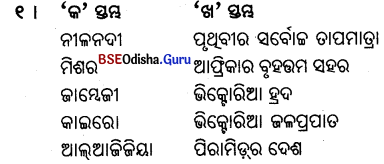
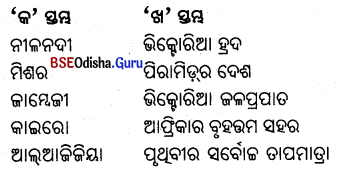
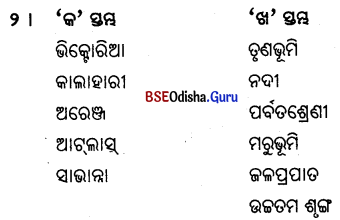
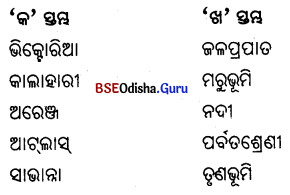
![]()
![]()
